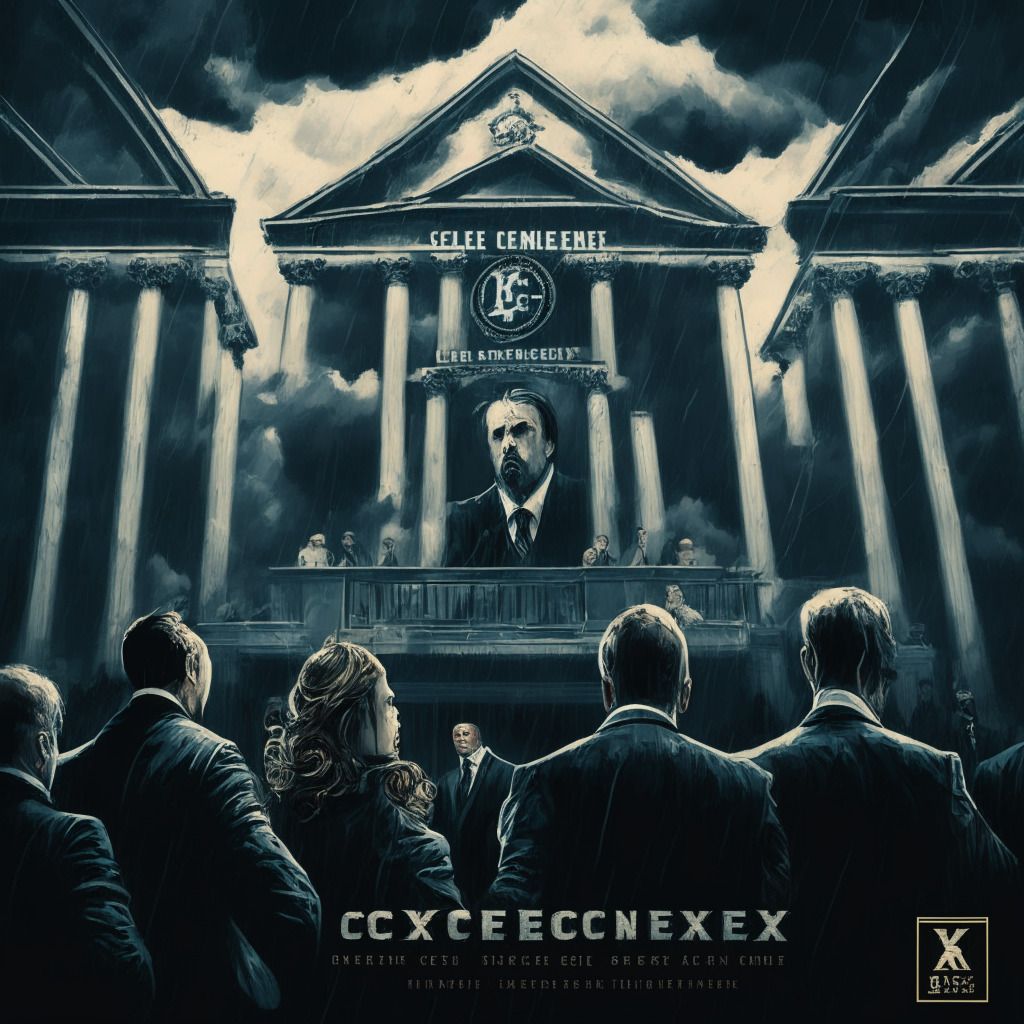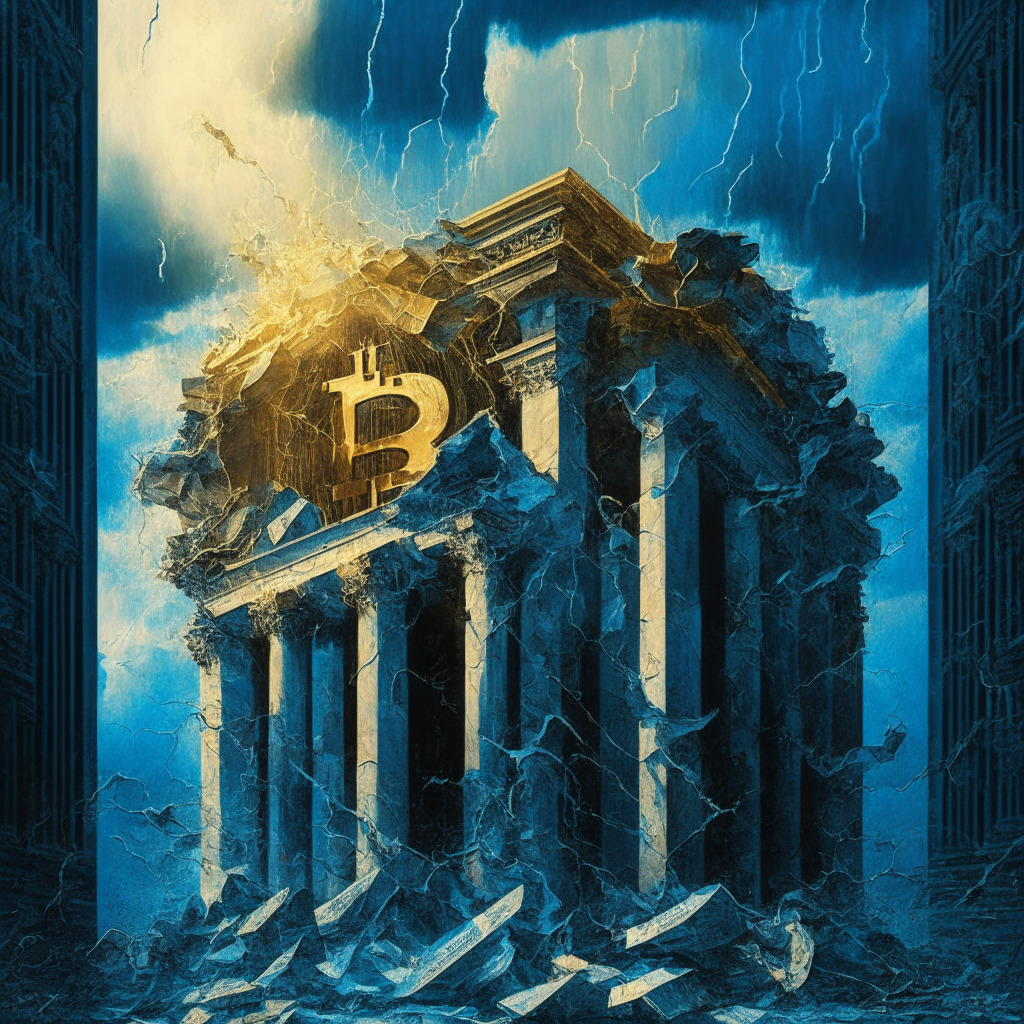The Manhattan federal court convicted ex-Minnesota Vikings co-owner Reginald Fowler in a $700 million crypto scam, highlighting the dangers of unregulated cryptocurrency transactions and shadow banking activities. Fowler’s case emphasizes the need for government and regulatory action to prevent fraud and protect the stability of the financial system.
Search Results for: Bank of America
Shadow Banking in Crypto: Fowler’s Case Highlights Need for Balanced Regulations
Reginald Fowler was sentenced to 75 months in prison for facilitating over $750 million in unregulated crypto transactions and violating U.S. money laundering laws. This case highlights the importance of crypto regulations, the need for transparency, and a balanced approach between compliance and innovation.
Revealed: Binance’s Influence Over Affiliate Binance.US Bank Accounts Raises Concerns
Bank records reveal Guangying Chen, a senior executive at Binance, as the primary operator for several Binance.US bank accounts, raising concerns about Binance’s influence over its supposed independent affiliate. This disclosure intensifies scrutiny as Binance faces legal action from U.S. regulatory agencies.
Shadow Banking in Crypto: Ex-NFL Owner’s $700M Case Sparks Regulatory Debate
Reginald Fowler, a former NFL team owner, received a six-year prison sentence for operating as a “shadow bank” in the crypto sector, involving over $700 million in unregulated transactions during 2018. The case emphasizes the risks of shadow banking, the need for proper regulation, and the balance between fostering innovation and ensuring financial system safety.
JPMorgan’s Blockchain Partnership With Indian Banks: Pros, Cons & GIFT City’s Future
JPMorgan Chase partners with six major Indian banks to launch a blockchain-based platform for settling interbank dollar transactions, aiming to enhance efficiency and expedite transactions. The pilot project utilizing JPMorgan’s Onyx platform is scheduled to start on Monday.
Sam Bankman-Fried Case: Crypto’s Regulatory Struggle Intensifies
The Sam Bankman-Fried case highlights the ongoing tension between the cryptocurrency industry and regulators, with charges including technicalities surrounding extradition and campaign finance violations. As crypto gains mainstream acceptance, finding common ground between industry enthusiasts and authorities remains a pressing concern.
US Bank Mergers: Solving the Crisis or Creating Riskier Financial Giants? Debating Pros and Cons
US Treasury Secretary Janet Yellen discussed the possibility of more bank mergers amid the ongoing banking crisis. However, concerns arise over the growing power of financial giants, potentially posing a threat to Americans and the economy. The delicate balance between ensuring stability and preventing “too big to fail” institutions remains a challenge.
FTX Bankruptcy Battle: Retrieving $240M from Embed Acquisition & Lessons for Crypto Industry
The controversial bankruptcy of crypto exchange FTX prompts efforts to retrieve over $240 million paid for stock trading platform Embed, amidst claims of inadequate investigation by former executives. The ongoing turmoil raises concerns about due diligence and highlights the importance of regaining lost finances and rebuilding the company’s reputation in the blockchain industry.
Bridging the Gap for the Unbanked: Azteco’s Bitcoin Vouchers and the Debate on KYC Regulations
Azteco, a Bitcoin payments firm, receives $6 million seed funding led by Jack Dorsey to simplify Bitcoin purchasing for unbanked populations through a unique voucher system. The system aims to address financial management, money transfer, and credit access issues for over two billion unbanked individuals worldwide.
Bankrupt Voyager Digital’s $1.33B Crypto Liquidation Plan: Relief for Customers or Added Complications?
The U.S. Bankruptcy Court approved Voyager Digital’s liquidation plan, enabling the return of approximately $1.33 billion in crypto to customers. This marks the third bankruptcy plan for Voyager, following Binance.US’s withdrawal from a previous agreement. Initial customer payments will be made in crypto or cash, with future litigations possibly impacting further distributions.
BNY Mellon’s Bold Move: Embracing Blockchain, Tokenization, and Digital Assets in Banking
BNY Mellon takes significant strides towards digital assets, focusing on custody and clearing services, implementing blockchain to modernize infrastructure, and exploring tokenization for democratizing investments. Emphasizing long-term vision and risk management, the bank aims to expand its offerings and adapt to emerging technologies.
Celebrities Face Lawsuit for Endorsing Bankrupt FTX: A Lesson in Crypto Investment Safety
A class action lawsuit against celebrities promoting bankrupt FTX gains momentum as connections to Florida emerge. The lawsuit accuses 12 celebrities of misleading customers in selling FTX yield-bearing digital currency accounts, causing over $11 billion in damages. This highlights the need for clearer regulations and diligence in cryptocurrency investments.
Bittrex US Bankruptcy Shakes Industry: Will Binance.US Face Similar Fate?
Bittrex US files for Chapter 11 bankruptcy following SEC’s accusation of running an unregistered securities exchange. The decision raises concerns over the future of other exchanges, as the crypto industry navigates a complex regulatory landscape.
Declining Trust in Banks: Will Crypto Emerge as Safer Alternative Amid Financial Turmoil?
A recent Gallup poll reveals that 48% of respondents in the US are concerned about their money in banks, with 20% being “very concerned.” In the context of the US banking system’s challenges, it remains to be seen if cryptocurrencies can emerge as a more stable and secure alternative for consumer finances.
Bittrex Bankruptcy Filing: Crypto Exchange Industry’s Battle with SEC and Future Implications
American cryptocurrency exchange Bittrex files for Chapter 11 bankruptcy amid SEC charges for non-compliance with securities law. The development raises concerns over crypto exchanges’ future and their ability to navigate complex regulatory landscapes.
Bank Crisis and Bitcoin’s Climb: Can It Reach $30k Amidst Global Market Turmoil?
Bitcoin’s price rebound targets $30,000 level due to the US banking crisis and concerns about the safety of funds in banks. However, the Central Bank of Argentina’s prohibition on cryptocurrency payments could impact the bullish trajectory. Monitoring market trends and support levels remains crucial for investors and traders.
Blockchain vs. Central Banking: Finding Clarity Amid Economic Ambiguity & The Human Element
The recent ambiguous messaging from the Federal Reserve has left markets craving clarity in policy-setting, highlighting the potential benefits of replacing human institutions with decentralized cryptographic monetary systems like Bitcoin. However, the complexity of the global economy demands flexibility and uncertainty in decision-making, still requiring a human touch. Policymakers should consider utilizing blockchain technology and cryptographic verification systems to provide critical clarity, transparency, and trust in the financial system.
Economic Mega-Crisis: Kennedy Challenges Biden, Debates Cryptocurrency & Banking Collapse
Robert F. Kennedy Jr. warns of an impending economic “mega-crisis,” calling for urgent attention to rebuild the economy as job openings plummet and inflation hits the middle and working class. Kennedy criticizes President Biden’s proposed Digital Asset Mining Energy (DAME) excise tax, asserting the importance of cryptocurrencies in driving innovation and maintaining financial freedom.
Bitcoin and Ethereum Surge Amid US Banking Crisis: Analyzing Layer 2 and PEPE Token Growth
Bitcoin and Ether experienced gains amid unresolved US banking crisis and declining job openings. Layer 2, Stacks, soared 177% over three months after Binance announced support for its upgrade. Meanwhile, new crypto PEPE token surpassed dogecoin and shiba inu in trading volumes.
Bank Failures: Unraveling the US Banking Sector and Impact on Global Economy
The recent collapse of First Republic Bank, the second-largest bank failure in US history, raises concerns about potential economic repercussions and systemic weaknesses within the US banking sector. Critics argue that the US Federal Reserve’s hawkish policies, including interest rate hikes, contributed to these failures, sparking discussions about the delicate balance governments and central banks must maintain between inflation control and a stable financial sector.
Biden’s Confidence in Banking Amid Defaults: Fact or Fiction? Pros, Cons, and Conflicts
Amid the recent collapse of the second, third, and fourth largest banks in American history, […]
US Banks Struggle with Low-Quality Commercial Real Estate Loans: Munger’s Insight
Charlie Munger, the vice chairman of Berkshire Hathaway, recently expressed concern about the quality of […]
JPMorgan Swallows First Republic Bank: A Banking Behemoth’s Feast or an Unexpected Lifeline?
JPMorgan Chase, the American banking colossus, has recently acquired all the assets of First Republic […]
Kiyosaki’s Cries of Conspiracy: Are Regional Banks Trampled in a Fed’s Bull Run to Support Giants?
Rich Dad Poor Dad author Robert Kiyosaki has warned in a series of tweets that […]
Satoshi Nakamoto’s Last Email, US Dollar’s Demise, and a Bank’s Struggle: A Crypto Rollercoaster of Emotions This Week
Another rollercoaster week has transpired in the world of crypto, marked by the anniversary of […]
Federal Reserve Meeting Affects Bitcoin and Ether Values: Crypto Exchange Boosts Liquidity Security
“Bitcoins remain steady as attendees anticipate Jerome Powell’s speech in Jackson Hole. Expectations are tempered, however, by Bank of America’s doubt for strong policy directives from the meeting, causing Bitcoin and Ether values to slip. Meanwhile, Binance seeks to boost liquidity security for low-liquidity token crypto projects and new stablecoin nCOP is introduced on the Polygon network in Colombia.”
Shifting Fortunes as Hedera Outshines Bitcoin and Ethereum Amid Legal and Corporate Drama
“Hedera Hashgraph’s HBAR token saw a 15% surge following its integration into the U.S. Federal Reserve’s instant payment solution, FedNow. Meanwhile, Bitcoin and Ethereum remained stable, highlighting how different tokens react uniquely to market factors. Also, Bank of America believes PayPal’s new stablecoin, PYUSD, may struggle to gain adoption due to competition and changing market conditions.”
PayPal’s PYUSD vs Major Stablecoins: A Battle for Market Share or a Losing Game?
“Bank of America suggests PayPal’s stablecoin, PYUSD, may struggle in the face of established competitors like USD Tether (USDT) and USD Coin (USDC). Factors such as lack of fresh functionality and wallet compatibility issues could impede its progress. However, PYUSD has potential to enhance customer experience within the PayPal ecosystem and capitalize on blockchain-enabled asset transfers, payments, and remittance services.”
Unleashing Blockchain’s Potential: Tokenization Revolution Amidst Digital Asset Landscape Tensi
“Tokenization, an application of blockchain that turns real-world assets into blockchain-based tokens, could revolutionize infrastructures and markets in the next decade according to Bank of America. However, they also anticipate the disappearance of 99% of current tokens due to inherent risks.”
Near-Term Crypto Market Growth Limited: Pros, Cons, and Balancing Act Amid Challenges
Cryptocurrency markets face limited near-term growth due to factors like low conviction and limited catalysts, according to Bank of America research. Despite uncertainties, traditional finance companies and tech firms continue developing blockchain applications, hinting at increased adoption and integration of cryptocurrency and blockchain technology in mainstream financial systems.
Crypto Correction or Opportunity? Examining Volatility, Presale Prospects and Market Risks
“Key market players Bitcoin and Ether witnessed a slump possibly due to inflation fears inspired by the Israel/Palestine conflict affecting oil producers. Amidst this, Ethereum Foundation’s substantial ETH token sale stirred the market. With rising uncertainty towards blue chip cryptocurrencies, crypto presale projects are emerging as high-risk-high-reward strategies attracting early investors.”
Fostering Adoption of Traditional Assets on Blockchain: The Role of the Tokenized Asset Coalition
Crypto industry leaders, including Coinbase and Circle, form the Tokenized Asset Coalition to spur adoption of traditional financial assets on blockchain. The coalition’s aim is to bring the “next trillion dollars of assets” to blockchain technology through education and advocacy, fostering the adoption of public blockchains, asset tokenization, and institutionalized decentralized finance (DeFi). This initiative predicts a more efficient, cost-effective, and transparent system with the adoption of tokenized assets.































